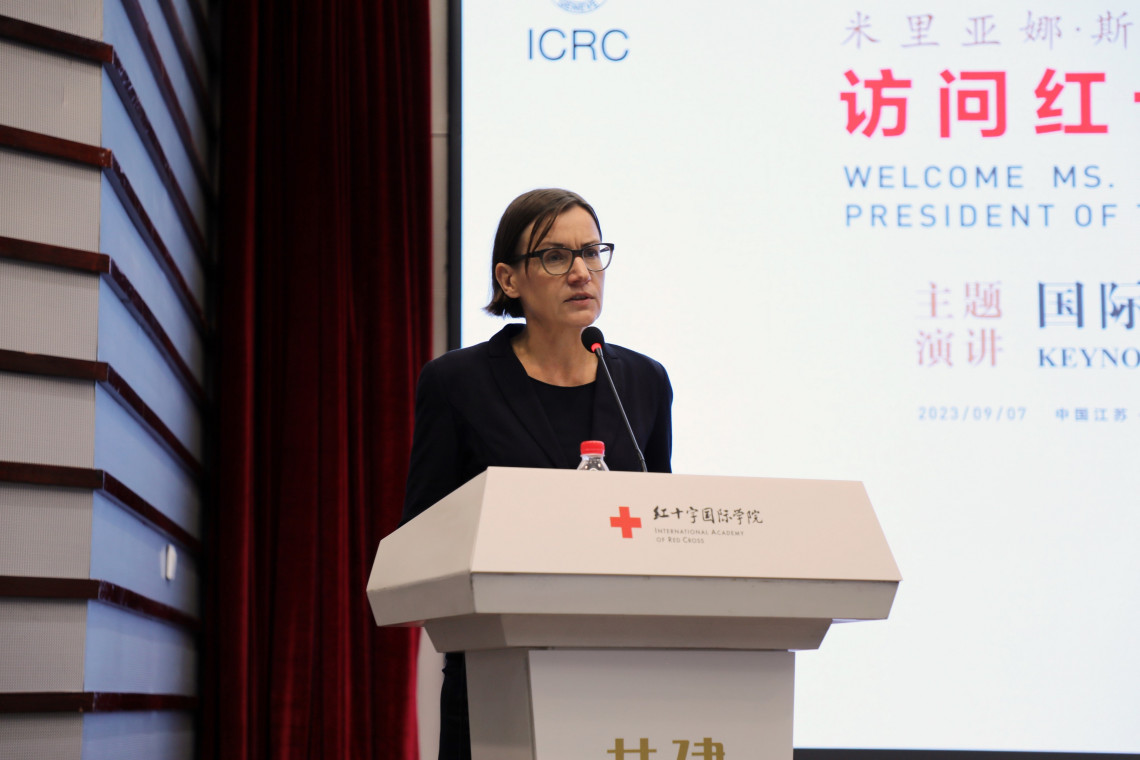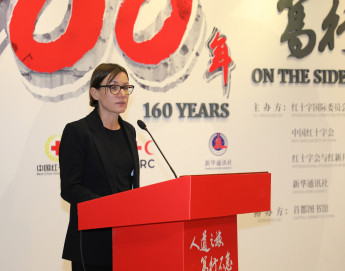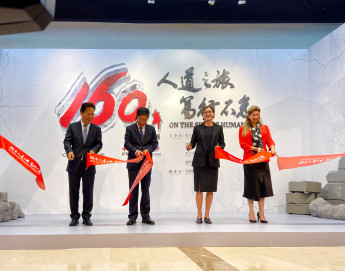
There are 100 steps to peace; the first are humanitarian

Mr. Chen Zhu, President of the Red Cross Society of China,
Mr. WANG Rupeng, Dean of International Academy of Red Cross and Red Crescent,
Good afternoon.
It is a privilege to be with you today, and to represent the ICRC as a partner of the Chinese Red Cross and co-founder of the international Academy of the Red Cross and Red Crescent. On behalf of the International Committee of the Red Cross, let me express my thanks and gratitude for making this moment of sharing possible, here on the campus of the Suzhou University.
I am pleased to be visiting China for the first time in my tenure as President of the ICRC, to take stock of and recognize the multidimensional engagements of the ICRC with China and reaffirm our commitment to building a long-term relationship with the Chinese Red Cross and its Academy.
A highlight of my visit was participating in the award ceremony of the Florence Nightingale medals to pay tribute to seven Chinese nurses for their exemplary contributions to healthcare and humanitarian services.
I was also pleased to inaugurate a photo exhibition in Beijing to mark the 160th anniversary of the ICRC and the broader International Red Cross Red Crescent Movement, which, through powerful images, showed what we exist for, and those for whom we act.
Distinguished guests, dear colleagues,
We live in a time of compounding global challenges which show how deeply interconnected our world has become. A generation is coming of age with an unprecedented ability to connect, communicate and collaborate across borders. It is also a generation whose material imprint will greatly influence the direction of the climate challenge we all now face.
Information travels faster than ever, and Artificial Intelligence (AI) is advancing at an exponential pace. Yet, palpable tensions are shaping relations among states which remain interdependent, but which nevertheless feel their important interests are challenged or threatened.
Countries have always balanced cooperation and competition. Advancing interests and striving for influence is normal. States around the world have historically projected military power in the name of peace: to maintain a status quo, or to deter their rivals.
But the story we tell ourselves matters as well. Whether interdependence enhances prosperity or competition leads to conflict depends as much on the events that surround us as it does on how those events are explained and perceived by world leaders and the media. A narrative lens can become a self-fulfilling prophecy that is recognized as the drumbeat of war only after it is already too late.
As I survey the globe, I see more than 100 armed conflicts around the world, none of which were inevitable. Creating the conditions for peace is one of the most important responsibilities of states. As an organization mandated to protect and assist victims of armed conflict, we at the International Committee of the Red Cross also have a responsibility: to speak on behalf of peace at a time when the prospect of war appears in public discourse with an unsettling casualness and frequency.
The ICRC knows war. My many thousand colleagues in the field know what armed violence does to humanity. They see its horrific toll on combatants and civilians every day. They help people who have lost their families or their homes. They treat gruesome injuries. They struggle against torture and rape. They see what war does to children and childhood. They see this violence inflicted by state and non-state actors, by GPS-guided munitions and home-made bombs, all over the world.
ICRC delegates usually work knowing that war's end – whether by decisive victory or negotiated peace – will not come any time soon. With every new armed conflict we confront, we know that chances are high it will drag on long enough to affect a generation or more – hindering possibilities for development and draining resources.
Armed conflict is not a periodic, once-in-a-lifetime event for us. In 160 years, the ICRC has never had a respite from war long enough to forget its ghastliness. It should therefore come as no revelation that the ICRC despises war and all its ills. And amidst the unconscionable number of ongoing armed conflicts worldwide, it should come as no surprise that I am compelled to speak out.
The principle of humanity, one of seven principles that guide the activities of the international Red Cross and Red Crescent movement, instructs us to promote mutual understanding, friendship, cooperation and lasting peace amongst all peoples.
Today, I would like to highlight the roles that the ICRC and international humanitarian law – IHL – can play when it comes to peace. I will not offer any views on specific conflicts, nor will I suggest that the ICRC has any part to play in determining how conflicts should be resolved. Our neutrality – the principle we rely on to be able to reach everyone in need of protection, no matter in whose hands they might be – must be preserved at all times.
Neutrality and the impartiality of IHL come with their own strengths.
With this in mind, I would like to highlight three ways the ICRC and IHL can contribute to the goal of peace. And I appeal to States and non-state armed groups to draw on them as part of their efforts to end ongoing armed conflicts and to prevent future ones.
First, the ICRC plays a role as neutral intermediary.
Maintaining dialogue between rivals is critical on many levels: for de-escalation, avoiding miscalculation, and – most importantly – ensuring that, should armed conflict break-out, there are ways to minimize its cost and restore peace.
The ICRC helps create and maintain channels of communication so that the parties can take the critical first steps toward preserving peace when it is threatened or support the secession of hostilities when a conflict has already broken out.
In this, the ICRC's neutrality is key. It secures the trust of all sides in our purely humanitarian role. States and armed groups who know us have relied on our good offices to enable a variety of initiatives: they have looked to the ICRC to provide their leaders with safe passage to participate in peace talks; to bring detainees home; to accompany members of separated families across front lines and reunite them with their relatives; to escort demining missions through combat zones and enable them to do their work; to transmit messages organizing ceasefires, simultaneous releases of detainees, and evacuations from fought-over or besieged areas; and to share information about the missing.
But our role as neutral intermediary is about more than the sum of these specific tasks. Dialogue of any kind through an impartial and independent go-between helps plant seeds of trust when the parties are unwilling or unable to talk directly. And the ICRC's presence can help prevent the total collapse of communication in the first place by prompting and facilitating dialogue on purely humanitarian issues. As one negotiator put it to us recently: there are 100 steps to peace; the first steps are humanitarian.
Second, respect for international humanitarian law and peace are mutually reinforcing.
It is easy to view IHL in isolation, as purely a set of regulations on how to conduct warfare. Or worse, some might wrongly view IHL as legitimizing armed conflict or excusing a resort to force.
But it is important to recall that IHL is just one small part of a vast international legal architecture which has peace at its centre. Peace has always been the overriding objective of the States that created the law of war. When States adopted the First Additional Protocol to the Geneva Conventions of 1949, they proclaimed "their earnest wish to see peace prevail among peoples."
When working to regulate conventional weapons, they stated as their goal "the ending of the arms race and the building of confidence among States, and hence to the realization of the aspiration of all peoples to live in peace."
There is no contradiction between applying humanitarian restraint in warfare and working in earnest for peace.
In fact, the faithful application of the law of armed conflict can bolster peace initiatives in important ways. Respect for IHL during conflict can contribute to the transition to peace by removing at least some obstacles to peacemaking: fewer displaced people, refugees and destroyed homes mean less effort spent on negotiating return or resettlement; better respect for legal safeguards in detention means more clarity and simplicity in determining whom to release and when; the resolution of missing cases and the reunification of families means relief from the collective anguish and resentment that can be an unmovable obstacle to peace; fewer war crimes mean fewer criminal investigations and arguments over post-conflict justice and accountability; and, as in all relationships, less cruelty in conflict means less hatred as an obstacle to resolving it.
IHL can also facilitate a return to peace by reducing the material cost of war. It can make it possible for civilian institutions that are important for domestic and international commerce to continue operating. And, in addition to saving lives, the protection of critical infrastructure and essential services can help preserve some measure of economic security for the population and make the resumption of normal life in the aftermath of conflict much easier.
IHL also brings opportunities to build trust between adversaries: for example, the collaboration across front lines that is necessary to account for the missing, separated and dead, and to return them to their families can unlock further dialogue.
IHL also contains specific provisions that can enable peace negotiations when the parties so decide. Even though IHL is a body of law that governs conduct in war, it also provides guideposts for a path out of war by, for example, providing a legal basis for the negotiation of "special agreements" between the parties. This includes cease-fires, detainee releases, amnesty deals, and peace accords. More broadly, it supplies an internationally sanctioned framework within which two warring sides can interrelate simply as "parties", without prejudice to their views on who is at fault for the conflict, or to the legal status and legitimacy of the enemy.
I also urge all relevant stakeholders to continue their work on clarification and development of IHL, not only for the contribution it will make to that body of law, but because these efforts serve as a reminder of what is at stake. Consultations among states, political declarations, and new conventions sharpen our focus on the potential human cost of war, and they tap into our collective desire to avoid that harm. Multilateral dialogue on IHL – whether in the framework of disarmament or in the context of our own international conference of the red cross and red crescent – builds confidence and a sense of shared purpose.
Every time we reaffirm the requirements of the law of armed conflict, we at the same time reaffirm our common humanity. Seeing the equal worth of individuals and communities is foundational for peace. It is my hope and motivation that the body of law the ICRC is mandated to safeguard makes some contribution to this higher purpose.
Finally, third, I call on all states to invest in peace.
The perspective I share with you today is not that of an expert on conflict resolution. But I represent thousands of dedicated colleagues with an incomparable depth of knowledge about the human cost of war. Their collective experience tells and retells the same story of devastation and loss. The fact is that IHL and principled humanitarian action can save lives and prevent some of armed conflict's worst consequences. But they cannot change the nature of war and its assault on our common humanity.
The only thing standing between prosperity and catastrophe is one's belief that there is no better path forward.
This is a time to invest in peace. Consider alternatives. Create options. To simply acknowledge that engagement in any armed conflict – whether viewed as justified or necessary – will come with a terrible human cost.
Our role as ICRC will be humble. It will be strictly neutral. But it might prove critical. We all have our part to play.
Thank you.


